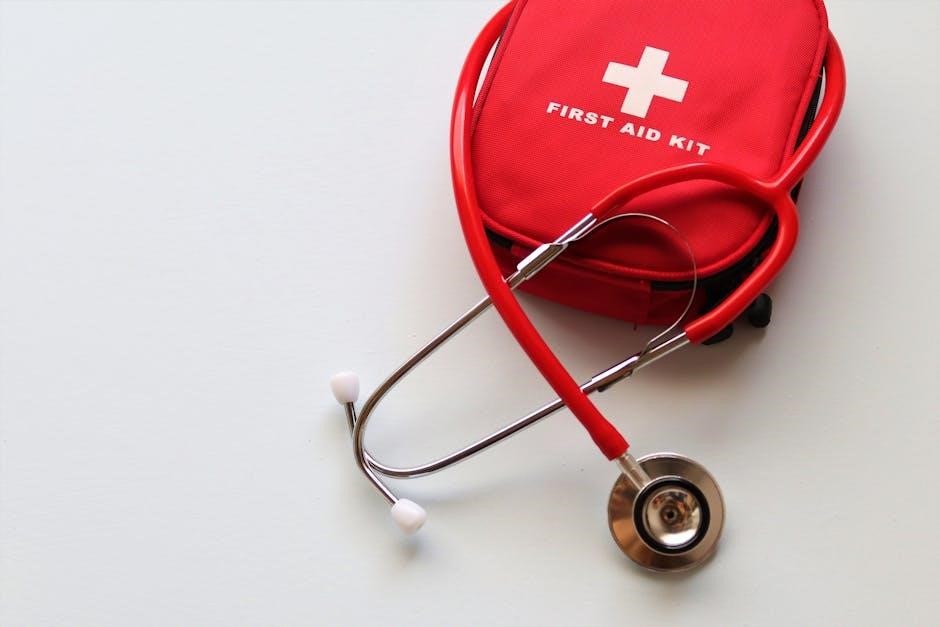nursing assistant book pdf
Nursing assistant books provide essential guidance for training and certification. They cover foundational concepts, clinical skills, and legal aspects, offering comprehensive resources for aspiring healthcare professionals. Popular titles like Mosby’s Textbook for Nursing Assistants and Nursing Assistant: A Basic Study Guide are widely recommended. These books are available in PDF formats, making them accessible for study and reference.
1.1 Overview of Nursing Assistant Roles
Nursing assistants play a vital role in healthcare, supporting patients with daily living activities and medical tasks. They work under licensed nurses, assisting with vital signs, mobility, and personal care. Their responsibilities include maintaining patient hygiene, monitoring health status, and ensuring safety. Nursing assistants also communicate patient needs to healthcare teams, promoting effective care. These roles are foundational in healthcare settings, requiring compassion, attention to detail, and strong interpersonal skills. Detailed descriptions of these roles are outlined in resources like Mosby’s Textbook for Nursing Assistants and Nursing Assistant: A Basic Study Guide.
1.2 Importance of Nursing Assistant Training
Nursing assistant training is crucial for providing high-quality patient care. It equips individuals with essential skills in clinical procedures, communication, and safety protocols. Proper training ensures adherence to ethical and legal standards, fostering professionalism. Textbooks like Mosby’s Textbook for Nursing Assistants and Nursing Assistant: A Basic Study Guide offer comprehensive resources, covering foundational concepts and practical applications. Effective training not only prepares assistants for certification but also enhances their ability to perform daily tasks confidently and compassionately, ensuring optimal patient outcomes and safety in healthcare settings.
1.3 Purpose of Nursing Assistant Books
Nursing assistant books serve as vital resources for education and professional development. They provide detailed information on patient care, clinical skills, and legal responsibilities. These books, such as Mosby’s Textbook for Nursing Assistants, are designed to prepare individuals for certification exams and real-world challenges. They include practical guides, case studies, and comprehensive coverage of foundational concepts like Maslow’s Hierarchy of Needs. Accessible in PDF formats, these texts ensure flexible learning, helping nursing assistants deliver compassionate and effective care while maintaining ethical standards in healthcare environments.
Key Topics Covered in Nursing Assistant Books
Nursing assistant books cover essential topics like patient care, communication, infection control, and emergency procedures. They also address legal and ethical considerations, ensuring comprehensive preparation for healthcare roles.
2.1 Roles and Responsibilities of Nursing Assistants
Nursing assistants play a crucial role in healthcare, assisting patients with daily activities like bathing, dressing, and eating. They monitor vital signs, report health changes, and ensure safety. These professionals also support medical staff with procedures and maintain patient confidentiality. Their responsibilities include preparing patients for exams, managing medical equipment, and adhering to infection control protocols. Effective communication and empathy are key, as they provide emotional support to patients and families. Nursing assistants are integral to delivering high-quality, person-centered care in various healthcare settings.
2.2 Fundamental Nursing Care Procedures
Fundamental nursing care procedures are essential for maintaining patient well-being. These include assisting with daily living activities, monitoring vital signs, and ensuring proper hygiene. Nursing assistants are trained to perform tasks like taking temperatures, measuring blood pressure, and providing wound care. They also support mobility by helping patients move safely and preventing falls. Proper use of medical equipment and adherence to infection control protocols are emphasized. These procedures are vital for delivering effective care and promoting patient comfort in clinical and residential settings.
2.3 Communication Skills in Healthcare
Effective communication is vital in healthcare, enabling nursing assistants to interact with patients, families, and healthcare teams. Clear verbal and non-verbal communication ensures understanding and builds trust. Active listening, empathy, and cultural sensitivity are emphasized to address diverse patient needs. Confidentiality and professionalism are maintained in all interactions. Nursing assistant books provide strategies to enhance these skills, ensuring clear documentation and effective collaboration. Strong communication fosters a supportive care environment and improves patient outcomes.
2.4 Infection Control and Safety Protocols
Infection control and safety protocols are critical for preventing the spread of infections in healthcare settings. Nursing assistant books emphasize proper hand hygiene, use of personal protective equipment (PPE), and sterilization techniques. These protocols ensure a safe environment for patients, staff, and visitors. Adherence to these guidelines is essential for maintaining high standards of care and reducing the risk of healthcare-associated infections. Proper training and consistent implementation of these practices are highlighted as key components of effective infection control strategies.
2.5 Patient Rights and Confidentiality
Patient rights and confidentiality are fundamental principles in healthcare, emphasizing respect for individuals’ autonomy and privacy. Nursing assistant books highlight the importance of maintaining patient dignity, informed consent, and the confidentiality of medical records. These principles are legally enforced through regulations like HIPAA, ensuring that healthcare providers protect sensitive information. Nursing assistants play a crucial role in upholding these standards, fostering trust between patients and healthcare professionals. Adhering to these guidelines is essential for ethical and lawful patient care.
2.6 Emergency Care and First Aid
Nursing assistant books detail essential emergency care and first aid procedures, equipping assistants with critical skills for immediate response. Topics include CPR, wound care, and injury assessment. These resources emphasize quick decision-making and proper techniques to stabilize patients until professional help arrives. Understanding these protocols is vital for ensuring patient safety and preventing further harm in urgent situations.
2.7 Legal and Ethical Considerations
Nursing assistant books address legal and ethical challenges, emphasizing patient confidentiality, HIPAA compliance, and professional conduct. They explore medical negligence, liability, and ethical dilemmas, providing guidance on decision-making. These resources highlight the importance of adhering to legal standards and upholding ethical principles, such as beneficence and respect for patient autonomy. Understanding these considerations is crucial for maintaining professional integrity and avoiding legal complications in healthcare settings.

Foundational Concepts in Nursing Care
Nursing assistant books introduce foundational concepts like Maslow’s Hierarchy of Needs, the nursing process, and care planning. These principles guide effective, patient-centered care and cultural competence.
3.1 Maslow’s Hierarchy of Needs
Maslow’s Hierarchy of Needs is a foundational concept in nursing care, emphasizing the prioritization of patient needs. It categorizes needs into physiological, safety, love, esteem, and self-actualization. Nursing assistants use this framework to address basic needs first, ensuring patients’ well-being. This theory helps in understanding patient motivations and tailoring care to individual requirements, promoting holistic and effective care delivery. It is frequently discussed in nursing assistant books to guide compassionate and patient-centered care practices.
3.2 Nursing Process and Care Planning
The nursing process is a systematic approach to delivering care, involving assessment, diagnosis, planning, implementation, and evaluation. Nursing assistants play a crucial role in gathering patient data during assessment, which informs care plans. Care planning ensures individualized, patient-centered strategies to meet specific needs. This structured approach promotes effective communication among healthcare teams and fosters better patient outcomes. Nursing assistant books emphasize the importance of understanding and contributing to the nursing process, ensuring evidence-based and compassionate care delivery tailored to each patient’s unique requirements and goals.
3.3 Cultural Competence in Nursing
Cultural competence in nursing is essential for providing inclusive care to diverse patient populations. Nursing assistant books emphasize understanding cultural differences, values, and beliefs to deliver personalized care. This includes addressing language barriers, religious practices, and traditional healing methods. By fostering cultural awareness, nursing assistants can build trust and improve communication, ensuring sensitive and effective care for all patients. These resources highlight the importance of cultural competence in promoting patient-centered care and enhancing healthcare outcomes across diverse settings.

Clinical Skills for Nursing Assistants
Clinical skills are essential for nursing assistants, including taking vital signs, assisting with ADLs, and using medical equipment. Books provide detailed guidance on these procedures, ensuring competence and safety in patient care.
4.1 Taking Vital Signs (Temperature, Pulse, Blood Pressure)
Taking vital signs is a fundamental skill for nursing assistants. These include measuring temperature, pulse, and blood pressure, which are critical for assessing patient health. Books like Mosby’s Textbook for Nursing Assistants provide step-by-step guidance on using thermometers, stethoscopes, and blood pressure cuffs accurately. Proper techniques ensure reliable readings, which are essential for detecting abnormalities and monitoring patient conditions. Nursing assistants must also understand normal ranges and how to document findings correctly, ensuring effective communication with healthcare teams.
4.2 Assisting with Daily Living Activities (ADLs)
Assisting with daily living activities (ADLs) is a core responsibility of nursing assistants. These tasks include bathing, dressing, eating, and toileting, which are essential for patient well-being. Nursing assistant books, such as Mosby’s Textbook for Nursing Assistants, provide detailed guidance on performing these activities safely and respectfully. Proper techniques ensure patient comfort and dignity, while also promoting independence. Guidebooks emphasize the importance of patience, attention to detail, and maintaining a supportive environment for individuals requiring assistance with ADLs.
4.3 Proper Use of Medical Equipment
Proper use of medical equipment is crucial for patient care and safety. Nursing assistant books, such as Mosby’s Textbook for Nursing Assistants, provide detailed instructions on operating devices like blood pressure monitors, thermometers, and wheelchairs. These guides emphasize safety protocols, infection control, and adherence to manufacturer guidelines. Understanding equipment functionality ensures accurate measurements and prevents errors. Training materials also cover troubleshooting common issues, promoting confidence and competence in healthcare settings. Correct equipment usage is essential for delivering high-quality, patient-centered care.
4.4 Wound Care and Infection Prevention
Proper wound care and infection prevention are critical skills for nursing assistants. Textbooks like Mosby’s Textbook for Nursing Assistants provide detailed guidelines on cleaning, dressing, and monitoring wounds to promote healing. Emphasis is placed on hand hygiene, use of sterile supplies, and adherence to infection control protocols. These resources also cover identifying signs of infection and preventing complications. Effective wound care ensures patient comfort, reduces infection risks, and supports overall recovery. Nursing assistants must follow established protocols to maintain a safe and hygienic environment for patients.

Popular Nursing Assistant Textbooks
Mosby’s Textbook for Nursing Assistants and Nursing Assistant: A Basic Study Guide are widely recommended. These books offer comprehensive training materials and are available in PDF formats for easy access.
5.1 “Mosby’s Textbook for Nursing Assistants”
Mosby’s Textbook for Nursing Assistants is a widely recognized resource for nursing assistant training. It covers essential topics such as patient care, infection control, and legal considerations. The textbook emphasizes hands-on skills and practical applications, making it ideal for both students and professionals. Available in PDF format, it provides accessible learning materials. This comprehensive guide is frequently updated to reflect current healthcare standards and practices, ensuring readers receive accurate and relevant information for certification and career success in the nursing assistant field.
5.2 “Nursing Assistant: A Basic Study Guide”
Nursing Assistant: A Basic Study Guide offers a clear and concise approach to nursing assistant training. Published by First Class Books, it focuses on foundational skills, patient care, and professional development. The guide is designed for both classroom and self-study, providing practical examples and exercises. Available in PDF format, it serves as a valuable resource for certification preparation. Its straightforward layout and comprehensive content make it a popular choice among students and professionals seeking to enhance their nursing assistant knowledge and skills effectively.

Nursing Assistant Curriculum and Training
Nursing assistant programs offer structured learning experiences, combining theoretical knowledge with hands-on training. Curricula cover patient care, safety protocols, and professional ethics, supported by textbooks and workbooks.
6.1 Overview of Nursing Assistant Programs
Nursing assistant programs provide comprehensive training for individuals to become certified healthcare professionals. These programs blend theoretical knowledge with practical skills, focusing on patient care, communication, and safety protocols. Curricula often include foundational topics like infection control, vital signs, and emergency procedures, ensuring students are well-prepared for clinical settings. Many programs incorporate textbooks and workbooks, such as Mosby’s Textbook for Nursing Assistants, to enhance learning and ensure a thorough understanding of healthcare practices and professional ethics.
6.2 Certification Requirements and Exams
Certification for nursing assistants typically requires completing a state-approved training program and passing a competency exam, such as the National Nurse Aide Assessment Program (NNAAP). The exam includes both a written and practical skills assessment. Many training programs use textbooks like Mosby’s Textbook for Nursing Assistants to prepare students for these exams. Additionally, some resources, like the American Red Cross Nurse Assistant Training textbook, provide detailed guides to help candidates understand exam formats and content, ensuring they are well-prepared for certification.

Legal and Ethical Issues in Nursing
Nursing assistants must understand legal and ethical standards, including patient rights, confidentiality, and professional conduct. Textbooks like Mosby’s Textbook for Nursing Assistants provide detailed guidance on these critical issues.
7.1 Patient Confidentiality and HIPAA
Patient confidentiality and HIPAA compliance are critical legal standards in healthcare. Nursing assistants must protect patients’ personal health information (PHI) and adhere to privacy regulations. Textbooks like Mosby’s Textbook for Nursing Assistants emphasize the importance of maintaining confidentiality and understanding HIPAA laws. They provide practical guidance on handling patient records, secure communication, and avoiding unauthorized disclosures. Violations can result in legal consequences, making it essential for nursing assistants to follow these ethical and legal guidelines rigorously in their daily practice.
7.2 Medical Negligence and Liability
Medical negligence and liability are significant concerns for nursing assistants. Textbooks such as Nursing Assistant: A Basic Study Guide discuss the legal implications of failing to meet standards of care. They outline scenarios where negligence can occur, like improper use of medical equipment or inadequate infection control. Understanding liability helps nursing assistants recognize the importance of following protocols and maintaining professional standards to minimize risks and ensure patient safety. This knowledge is crucial for protecting both patients and healthcare providers from legal consequences.
Preparation for Certification
Study guides and practice exams are essential for certification prep. Books like Mosby’s Textbook for Nursing Assistants offer comprehensive review materials and test-taking strategies, ensuring exam readiness.
8.1 Study Guides and Resources
Study guides and resources are crucial for nursing assistant certification preparation. Books like Mosby’s Textbook for Nursing Assistants and Nursing Assistant: A Basic Study Guide provide detailed content, practice questions, and real-world examples. These guides cover essential topics such as patient care, communication, and legal considerations. Many resources are available in PDF formats, making them easily accessible for self-study. They also include review materials and test-taking strategies to help candidates prepare effectively for certification exams, ensuring a strong foundation for success in the healthcare field.
8.2 Practice Exams and Test-Taking Strategies
Practice exams and test-taking strategies are essential for nursing assistant certification success. Many study guides, including Mosby’s Textbook for Nursing Assistants, offer practice exams with realistic questions and timed formats. These resources help candidates familiarize themselves with the exam structure and content. Test-taking strategies, such as active reading and process-of-elimination techniques, are also emphasized. Additionally, free PDF resources provide access to sample questions and answers, enabling candidates to assess their knowledge and improve weak areas, ensuring they are well-prepared for the certification exam.

Cost and Availability of Nursing Assistant Books
Nursing assistant books vary in price, with textbooks and workbooks costing $85 and handbooks around $19. Free PDF resources are also available for download online.
9.1 Pricing of Textbooks and Workbooks
Nursing assistant textbooks and workbooks vary in price, typically ranging from $19 to $85. Popular titles like Mosby’s Textbook for Nursing Assistants and Nursing Assistant: A Basic Study Guide are priced around $85 for comprehensive editions. Workbooks and handbooks, such as those approved by state nursing boards, are more affordable, often costing $19-$30. Some packages include both textbooks and workbooks, offering a cost-effective option for students. Prices may vary depending on the publisher, edition, and format, such as hardcover or digital versions.
9.2 Free PDF Resources and Downloads
Free PDF resources for nursing assistant books are widely available online, offering accessible learning materials. Websites provide downloadable versions of textbooks, study guides, and workbooks. These resources often include comprehensive chapters on patient care, safety protocols, and professional skills. Popular titles like Mosby’s Textbook for Nursing Assistants and Nursing Assistant: A Basic Study Guide can be found in PDF format, enabling easy access for students and professionals. These free resources are invaluable for those seeking affordable education and training in nursing assistance.

Best Practices for Using Nursing Assistant Books
Effective study techniques include highlighting key concepts, taking notes, and reviewing chapters regularly; Integrate theory with practical training to enhance understanding and application of nursing skills. Utilize practice exams and test-taking strategies to prepare for certification. These methods ensure comprehensive learning and successful outcomes in nursing assistant training.
10.1 Effective Study Techniques
Effective study techniques for nursing assistant books involve active reading, note-taking, and highlighting key concepts. Use practice exams to apply knowledge and identify weak areas. Regular review of chapters ensures retention of critical information. Integrating theory with practical training enhances understanding and application of skills. Consistent study habits, such as dedicating specific times for learning, improve overall mastery of nursing assistant responsibilities and preparation for certification exams.
10.2 Integrating Theory with Practical Training
Nursing assistant books play a crucial role in bridging theory and practice. They provide structured learning materials that align with hands-on training, ensuring a comprehensive understanding of patient care. Chapters often include skill demonstrations, care plans, and clinical scenarios, helping learners apply theoretical knowledge in real-world settings. By combining textbook concepts with practical exercises, students develop the confidence and competence needed for effective patient care and certification success.

Safety and Emergency Procedures
Nursing assistant books emphasize fire safety, evacuation plans, and handling medical emergencies. They outline standard emergency care procedures and protocols for ensuring patient and staff safety.
11.1 Fire Safety and Evacuation Plans
Nursing assistant books detail fire safety protocols, including identifying emergency exits and understanding alarm systems. They emphasize the importance of evacuation drills and preparedness. These resources outline procedures for safely evacuating patients, using equipment like wheelchairs, and ensuring all individuals reach designated assembly points. Clear communication and teamwork are stressed to maintain order during emergencies. Regular fire safety training is highlighted as a critical component of healthcare worker preparedness.
11.2 Handling Medical Emergencies
Nursing assistant books emphasize the importance of quick and effective responses to medical emergencies. They provide detailed guidance on procedures such as CPR, first aid, and wound care. These resources also cover assessment techniques, including evaluating vital signs and identifying signs of distress. Proper use of emergency equipment, like defibrillators and oxygen tanks, is thoroughly explained. Clear communication and teamwork are highlighted as critical components of effective emergency care. The goal is to ensure patient safety and optimal outcomes during critical situations.
Nursing assistant books are invaluable resources, offering comprehensive guides on patient care, essential concepts, and exam preparation. Their availability in PDF formats enhances accessibility for learners.
12.1 Summary of Key Points
Nursing assistant books are essential for understanding the roles, responsibilities, and skills required in healthcare settings. They cover foundational concepts, clinical procedures, and ethical considerations, ensuring comprehensive preparation for certification. Topics like patient care, communication, and safety protocols are emphasized, alongside legal and emergency procedures. These resources, often available in PDF formats, provide accessible learning materials. By integrating theory with practical training, nursing assistant books serve as invaluable tools for both education and professional development in the healthcare field.
12.2 Final Tips for Nursing Assistant Success
Success as a nursing assistant requires continuous learning, effective communication, and professionalism. Utilize study guides and practice exams to prepare for certification. Focus on hands-on training to master clinical skills. Stay updated on medical practices and ethical standards. Building strong patient relationships and maintaining confidentiality are crucial. Use resources like “Mosby’s Textbook” and online PDFs to enhance knowledge. By integrating theory with practice and adhering to safety protocols, nursing assistants can excel in their roles and provide compassionate care.

Additional Resources
Explore recommended websites like the American Red Cross for training materials and professional organizations offering support for nursing assistants. Utilize online forums and educational platforms for continuous learning.
13.1 Recommended Websites for Nursing Assistants
Visit the American Red Cross website for nurse assistant training materials and resources. Explore Pearson IT Certification for study guides and practice exams. The National Association of Health Care Assistants (NAHCA) offers professional development tools. Additionally, NursingAssistantGuides.com provides free PDF downloads and exam preparation tips. These platforms are essential for accessing updated materials, networking, and enhancing your nursing assistant career.
13.2 Professional Organizations and Support Groups
Joining professional organizations enhances networking and career growth. The National Association of Health Care Assistants (NAHCA) offers certifications, training, and advocacy. The American Red Cross provides nurse assistant training and resources. Additionally, the National Network of Career Nursing Assistants supports professional development. These groups provide mentorship, continuing education, and access to industry events. Engaging with them fosters a sense of community and keeps you updated on best practices in patient care and professional ethics.


